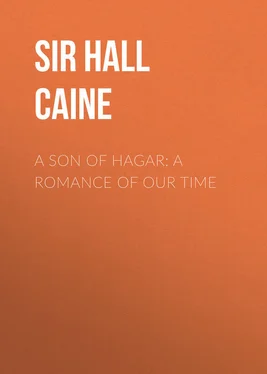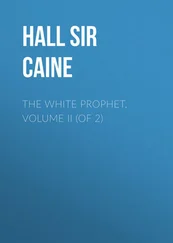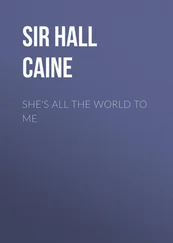Hall Caine - A Son of Hagar - A Romance of Our Time
Здесь есть возможность читать онлайн «Hall Caine - A Son of Hagar - A Romance of Our Time» — ознакомительный отрывок электронной книги совершенно бесплатно, а после прочтения отрывка купить полную версию. В некоторых случаях можно слушать аудио, скачать через торрент в формате fb2 и присутствует краткое содержание. Жанр: foreign_antique, foreign_prose, на английском языке. Описание произведения, (предисловие) а так же отзывы посетителей доступны на портале библиотеки ЛибКат.
- Название:A Son of Hagar: A Romance of Our Time
- Автор:
- Жанр:
- Год:неизвестен
- ISBN:нет данных
- Рейтинг книги:5 / 5. Голосов: 1
-
Избранное:Добавить в избранное
- Отзывы:
-
Ваша оценка:
- 100
- 1
- 2
- 3
- 4
- 5
A Son of Hagar: A Romance of Our Time: краткое содержание, описание и аннотация
Предлагаем к чтению аннотацию, описание, краткое содержание или предисловие (зависит от того, что написал сам автор книги «A Son of Hagar: A Romance of Our Time»). Если вы не нашли необходимую информацию о книге — напишите в комментариях, мы постараемся отыскать её.
A Son of Hagar: A Romance of Our Time — читать онлайн ознакомительный отрывок
Ниже представлен текст книги, разбитый по страницам. Система сохранения места последней прочитанной страницы, позволяет с удобством читать онлайн бесплатно книгу «A Son of Hagar: A Romance of Our Time», без необходимости каждый раз заново искать на чём Вы остановились. Поставьте закладку, и сможете в любой момент перейти на страницу, на которой закончили чтение.
Интервал:
Закладка:
As second son of a Cumbrian statesman, whose estate consisted chiefly of land, he expected but little from his father, and had been trained in the profession of a mining engineer. After spending a few months at the iron mines of Cleator, he had removed to London at twenty-two, and enrolled himself as a student of the Mining College in Jermyn Street. There he had spent four years, sharing the chambers of a young barrister in the Temple Gardens. His London career was uneventful. Taciturn in manner, he made few friends. His mind had a tendency toward contemplative inactivity. Of physical energy he had very little, and this may have been partly due to his infirmity. Late at night he would walk alone in the Strand: the teeming life of the city, and the mystery of its silence after midnight, had a strong fascination for him. In these rambles he came to know some of the strangest and oddest of the rags and rinsings of humanity: among them a Persian nobleman of the late shah's household, who kept a small tobacco-shop at the corner of a by-street, and an old French exile, once of the court of Louis Phillippe, who sold the halfpenny papers. At other times he went out hardly at all, and was rarely invited.
Only the housemate, who saw him at all times and in many moods, seemed to suspect that beneath that cold exterior there lay an ardent nature. But he himself knew how strong was the tide of his passion. He could never look a beautiful woman in the face but his pulse beat high, and he felt almost faint. Yet strong as his passion was, his will was no less strong. He put a check on himself, and during his four years in London contrived successfully to dam up the flood that was secretly threatening him.
At six-and-twenty he returned to Cumberland, having some grounds for believing that his father intended to find him the means of mining for himself. A year had now passed, and nothing had been done. He was growing sick with hope deferred. His elder brother, Paul, had spent his life on the land, and it was always understood that in due course he would inherit it. That at least was the prospect which Hugh Ritson had in view, though no prospective arrangement had been made. Week followed week, and month followed month, and his heart grew bitter. He had almost decided to end this waiting. The day would come when he could bear it not longer, and then he would cut adrift.
An accidental circumstance was the cause of his irresolution. He used to walk frequently on the moss where the Laird Fisher sunk his shaft. In the beck that ran close to the disused headgear he would wade for an hour early in the summer morning. One day he saw the old laird's daughter washing linen at the beck-side. He remembered her as a pretty, prattling thing of ten or eleven. She was now a girl of eighteen, with a pure face, a timid manner, and an air that was neither that of a woman nor of a child. Her mother was lately dead, her father spent most of his days on the fell (some of his nights also when the charcoal was burning), and she was much alone. Hugh Ritson liked her gentle replies and her few simple questions. So it came about that he would look for her in the mornings, and be disappointed if he did not catch sight of her good young face. Himself a silent man, he liked to listen to the girl's modest, unconnected talk. His stern eyes would soften at such times to a sort of caressing expression. This went on for months, and in that solitude no idle tongue was set to wag. At length Hugh Ritson perceived that the girl's heart was touched. If he came late he found her leaning over the gate, her eyes bent down among the mountain grasses at her feet, and her cheeks colored by a red glow. It is unnecessary to go further. The girl gave herself up to him with her whole heart and soul, and he – well, he found the bulwarks with which he had surrounded himself were ruined and down.
Then the awakening came, and Hugh learned too late that he had not loved the simple child, by realizing that with all the ardor of his restrained but passionate nature he loved another woman.
So much for the first complication in the tragedy of this man's life.
The second complication was new to his consciousness, and it was at this moment conspiring with the first to lure him to consequences that are now to be related. The story which Mr. Bonnithorne had told of the legacy left by Greta's father to a son by one Grace Ormerod had come to him at a time when, owing to disappointment and chagrin, he was peculiarly liable to the temptation of any "honest trifle" that pointed the way he wished to go. If the Grace Ormerod who married Lowther had indeed been his own mother, then – a thousand to one – Paul was Lowther's son. If Paul was Lowther's son he was also half brother of Greta. If Paul was not the son of Allan Ritson, then he himself, Hugh Ritson, was his father's heir.
In the present whirlwind of feeling he did not inquire too closely into the pros and cons of probability. Enough that evidence seemed to be with him, and that it transformed the world in his view.
Perhaps the first result of this transformation was that he unconsciously assumed a different attitude toward the unhappy passage in his life wherein Mercy Fisher was chiefly concerned. What his feeling was before Mr. Bonnithorne's revelation, we have already seen. Now the sentiment that made much of such an "accident" was fit only for a "turgid melodrama," and the idea of "atonement" by "marriage" was the mock heroic of those "great lovers of noble histories," the spectators who applaud it from the pit.
When he passed Mr. Bonnithorne in the hall at the Ghyll he was on his way to the cottage of the Laird Fisher. He saw in the road ahead of him the group which included his father and the charcoal-burner, and to avoid them he cut across the breast of the Eel Crags. After a sharp walk of a mile he came to a little white-washed house that stood near the head of Newlands, almost under the bridge that crosses the fall. It was a sweet place in a great solitude, where the silence was broken only by the tumbling waters, the cooing of pigeons on the roof, and the twittering of ringouzels by the side of the torrent. The air was fresh with the smell of new peat. There was a wedge-shaped garden in front, and it was encompassed by chestnut-trees. As Hugh Ritson drew near he noticed that a squirrel crept from the fork of one of these trees. The little creature rocked itself on the thin end of a swaying branch, plucking sometimes at the drooping fan of the chestnut, and sometimes at the prickly shell of its pendulous nut. When he opened the little gate Hugh Ritson observed that a cat sat sedately behind the trunk of that tree, glancing up at intervals at the sporting squirrel in her moving seat.
As he entered the garden Mercy was crossing it with a pail of water just raised from the well. She had seen him, and now tried to pass into the house. He stepped before her and she set down the pail. Her head was held very low, and her cheeks were deeply flushed.
"Mercy," he said, "it is all arranged. Mr. Bonnithorne will see you into the train this evening, and when you get to your journey's end the person I spoke of will meet you."
The girl lifted her eyes beseechingly to his face.
"Not to-day, Hugh," she said in a broken whisper; "let me stay until to-morrow."
He regarded her for a moment with a steadfast look, and when he spoke again his voice fell on her ear like the clank of a chain.
"The journey has to be made. Every week's delay increases the danger."
The girl's eyes fell again, and the tears began to drop from them on to the brown arms that she had clasped in front.
"Come," he said in a softer tone, "the train starts in an hour. Your father is not yet home from the pit, and most of the dalespeople are at the sports. So much the better. Put on your cloak and hat and take the fell path to the Coledaie road-ends. There Mr. Bonnithorne will meet you."
Читать дальшеИнтервал:
Закладка:
Похожие книги на «A Son of Hagar: A Romance of Our Time»
Представляем Вашему вниманию похожие книги на «A Son of Hagar: A Romance of Our Time» списком для выбора. Мы отобрали схожую по названию и смыслу литературу в надежде предоставить читателям больше вариантов отыскать новые, интересные, ещё непрочитанные произведения.
Обсуждение, отзывы о книге «A Son of Hagar: A Romance of Our Time» и просто собственные мнения читателей. Оставьте ваши комментарии, напишите, что Вы думаете о произведении, его смысле или главных героях. Укажите что конкретно понравилось, а что нет, и почему Вы так считаете.

![Михаил Лермонтов - A Hero of Our Time [New Translation]](/books/27671/mihail-lermontov-a-hero-of-our-time-new-translati-thumb.webp)










